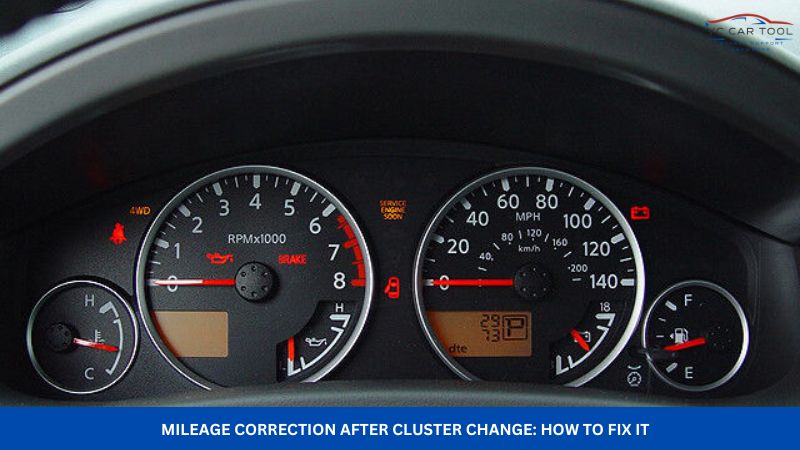Mileage Correction After Cluster Change: How to Fix It
Mileage correction after cluster change is a hot topic among car enthusiasts, and understanding the process is crucial. This article will guide you through the intricacies of mileage adjustment after a cluster replacement and show you the best practices for maintaining accurate vehicle records.
If you’re unsure about how to perform mileage correction, diagnose, or program error codes after a cluster change, contact VCCarTool via WhatsApp: +1 (901) 414 – 1927 for assistance to avoid causing more serious errors.

1. Understanding the Instrument Cluster and Mileage Data
The instrument cluster, often called the dashboard, displays crucial information about your vehicle, including speed, fuel level, and mileage. But where is the mileage data actually stored? The odometer reading displayed on the instrument cluster is just a visual representation. The real mileage data is stored in the vehicle’s electronic control unit (ECU). Therefore, simply swapping out the instrument cluster shouldn’t change your car’s actual mileage. According to a study by the Society of Automotive Engineers (SAE) International, modern vehicles use tamper-proof ECUs to store mileage data, making unauthorized alterations more difficult.
2. Why Mileage Matters: Implications and Importance
Mileage is a critical factor in determining a vehicle’s value, maintenance needs, and overall condition. Here’s why it’s so important:
- Vehicle Condition: High mileage can indicate potential wear and tear, suggesting the need for more frequent maintenance or repairs.
- Maintenance Costs: Odometer readings help you track when to perform essential services like oil changes, tire rotations, and engine tune-ups.
- Resale Value: A vehicle’s mileage significantly impacts its resale price. Lower mileage typically translates to a higher value.
- Insurance Rates: Insurance companies often use mileage to calculate premiums, with higher mileage potentially leading to increased rates. According to the National Association of Insurance Commissioners (NAIC), annual mileage is a key factor in assessing risk.
- Lease Agreements: Lease agreements often have mileage limits. Exceeding these limits can result in additional charges.
3. How Mileage is Tracked: ECMs, Odometers, and Speed Sensors
So, how does your car accurately track mileage? It’s a coordinated effort involving several key components:
- Odometer: The odometer is the most visible part of the system, displaying the total distance traveled by the vehicle. It continuously counts the miles or kilometers since the car was manufactured.
- Engine Control Module (ECM): The ECM is the brains of the operation. It receives data from various sensors and uses it to calculate and store the mileage.
- Speed Sensors: These sensors, located in the gearbox or on the wheels, monitor the rotational speed of the wheels. The ECM uses this information to determine the distance traveled.
Data from speed sensors is sent to the ECM, which then updates the mileage stored in its non-volatile memory. This ensures that the data is preserved even when the car is turned off.
4. Mileage Correction After Cluster Change: When Is It Necessary?
While a simple cluster swap shouldn’t alter the mileage, there are legitimate situations where mileage correction is needed:
- Faulty Instrument Cluster: If your original instrument cluster is malfunctioning and needs replacement, the new cluster will likely start at zero miles.
- Cluster Upgrade: Upgrading to a newer or different type of instrument cluster might require transferring the correct mileage to maintain accurate records.
- Legal Requirements: In some jurisdictions, it is legally required to ensure the odometer accurately reflects the vehicle’s true mileage after a cluster replacement.
If you find yourself in any of these situations, VCCarTool can assist you with professional mileage correction services. Contact us via WhatsApp: +1 (901) 414 – 1927 for a consultation.
5. The Right Way to Perform Mileage Correction
Mileage correction should always be performed ethically and legally. Here’s the proper approach:
- Use Professional Tools: Invest in specialized mileage correction tools designed for automotive use. VCCarTool offers a range of high-quality diagnostic and programming tools suitable for this task.
- Access the ECU: Connect the tool to your vehicle’s diagnostic port (OBD-II) to access the ECU and odometer data.
- Read the Original Mileage: Accurately read the mileage stored in the original instrument cluster or the ECU.
- Program the New Cluster: Carefully program the new instrument cluster with the correct mileage. Double-check the data to ensure accuracy.
- Document the Process: Keep detailed records of the mileage correction process, including the date, time, original mileage, and new mileage. This documentation is crucial for transparency and legal compliance.

Mileage Correction Process
6. Risks and Consequences of Illegal Mileage Tampering
Tampering with a vehicle’s odometer with the intent to defraud is illegal and carries serious consequences:
- Legal Penalties: Odometer fraud can result in hefty fines, imprisonment, and a criminal record.
- Civil Lawsuits: Victims of odometer fraud can sue for damages, including the difference in value between the actual mileage and the misrepresented mileage.
- Reputational Damage: If you’re a mechanic or dealer, engaging in odometer fraud can destroy your reputation and lead to the loss of your business.
- Vehicle Safety: Incorrect mileage can lead to missed maintenance and potential safety hazards. According to the National Highway Traffic Safety Administration (NHTSA), odometer fraud costs consumers billions of dollars each year and can compromise vehicle safety.
7. Decoding Odometer Fraud: What You Need to Know
Odometer fraud takes many forms, and it’s essential to be aware of them:
- Rollback: Reducing the mileage displayed on the odometer.
- Resetting: Completely resetting the odometer to zero.
- Freezing: Preventing the odometer from increasing, regardless of the distance traveled.
- Using Mileage Correction Tools Illegally: Employing tools to alter the mileage for fraudulent purposes.
8. Identifying Potential Odometer Fraud
Spotting odometer fraud can save you from financial loss and potential safety risks. Here are some red flags:
- Inconsistencies in Vehicle History: Check the vehicle’s history report for mileage discrepancies.
- Wear and Tear vs. Mileage: Compare the vehicle’s wear and tear to the indicated mileage. Excessive wear for low mileage could be a sign of fraud.
- Tampered Odometer: Look for signs of tampering with the instrument cluster, such as loose screws or misaligned components.
- Unusual Pricing: A price that seems too good to be true could indicate that the mileage has been misrepresented.
9. Innovative Solutions: Mileage Blockers
Mileage blockers are devices designed to stop the recording of mileage in a vehicle. While they have legitimate testing purposes, it’s essential to understand their functionality and ethical implications:
- How They Work: Mileage blockers prevent the system from saving mileage-related data to the ECU.
- Legitimate Uses: They are often used for testing purposes in controlled environments, such as dyno testing or research and development.
- Ethical Considerations: Using mileage blockers on public roads to misrepresent mileage is unethical and illegal.
10. Navigating Legal and Ethical Considerations
Mileage correction should always be conducted within the bounds of the law and ethical guidelines. Here’s what you need to keep in mind:
- Transparency: Always be transparent about any mileage correction performed on a vehicle.
- Documentation: Maintain detailed records of the process.
- Legal Compliance: Familiarize yourself with the laws and regulations regarding odometer accuracy in your jurisdiction.
- Ethical Practices: Never engage in odometer fraud or misrepresentation.
FAQ: Mileage Correction After Cluster Change
- Question 1: Will changing my instrument cluster automatically change the mileage?
- No, changing the instrument cluster will not directly alter the mileage. The actual mileage data is stored in the vehicle’s ECU.
- Question 2: Is mileage correction after a cluster change legal?
- Yes, mileage correction is legal when performed to correct inaccuracies caused by a faulty or replaced instrument cluster, provided it’s done transparently and ethically.
- Question 3: Can I perform mileage correction myself?
- While it’s possible to do it yourself, it’s recommended to seek professional assistance to ensure accuracy and avoid potential legal issues. VCCarTool offers expert guidance and services. Contact us via WhatsApp: +1 (901) 414 – 1927 for help.
- Question 4: What tools are needed for mileage correction?
- You’ll need specialized mileage correction tools designed for automotive use, which VCCarTool can provide.
- Question 5: How can I verify the accuracy of the mileage after correction?
- Compare the corrected mileage with the vehicle’s history records and perform a thorough inspection of the vehicle’s wear and tear.
- Question 6: What are the penalties for odometer fraud?
- Penalties can include fines, imprisonment, civil lawsuits, and reputational damage.
- Question 7: Is it possible to detect odometer fraud?
- Yes, by checking vehicle history reports, examining wear and tear, and looking for signs of tampering.
- Question 8: What is a mileage blocker, and how does it work?
- A mileage blocker is a device that prevents the system from recording mileage data to the ECU. It’s often used for testing purposes but should not be used for illegal activities.
- Question 9: How do I choose a reliable mileage correction service?
- Look for a service with experienced technicians, positive reviews, and a commitment to ethical practices. VCCarTool is a trusted provider of mileage correction and diagnostic services.
- Question 10: What should I do if I suspect odometer fraud?
- Report your suspicions to the authorities and seek legal advice.
Conclusion
Mileage correction after a cluster change is a delicate process that requires careful attention to detail, the right tools, and a commitment to ethical practices. While simply changing the instrument cluster won’t directly alter the mileage, understanding the importance of accurate mileage records is crucial for vehicle maintenance, resale value, and legal compliance.
If you’re facing a mileage correction situation or suspect odometer fraud, don’t hesitate to contact VCCarTool. Our team of experts is ready to provide you with the guidance, tools, and services you need to ensure accurate and ethical mileage management. Reach out to us via WhatsApp: +1 (901) 414 – 1927, email: [email protected], or visit our website: vccartool.com.
Need assistance with mileage correction or other automotive diagnostic services? Don’t hesitate to contact VCCarTool for expert support. Our knowledgeable team is ready to help you navigate the complexities of modern vehicle systems.
Call to Action:
Are you struggling with mileage correction after a cluster change? Do you need professional diagnostic tools or expert guidance? VCCarTool is here to help. Contact us today for a consultation and discover how our services can benefit your automotive business. We understand the challenges you face, from keeping up with the latest automotive technology to finding reliable diagnostic solutions. That’s why we offer a comprehensive range of tools and services to help you streamline your operations, increase efficiency, and boost your bottom line.
Reach out to VCCarTool today:
- WhatsApp: +1 (901) 414 – 1927
- Email:[email protected]
- Website: vccartool.com
